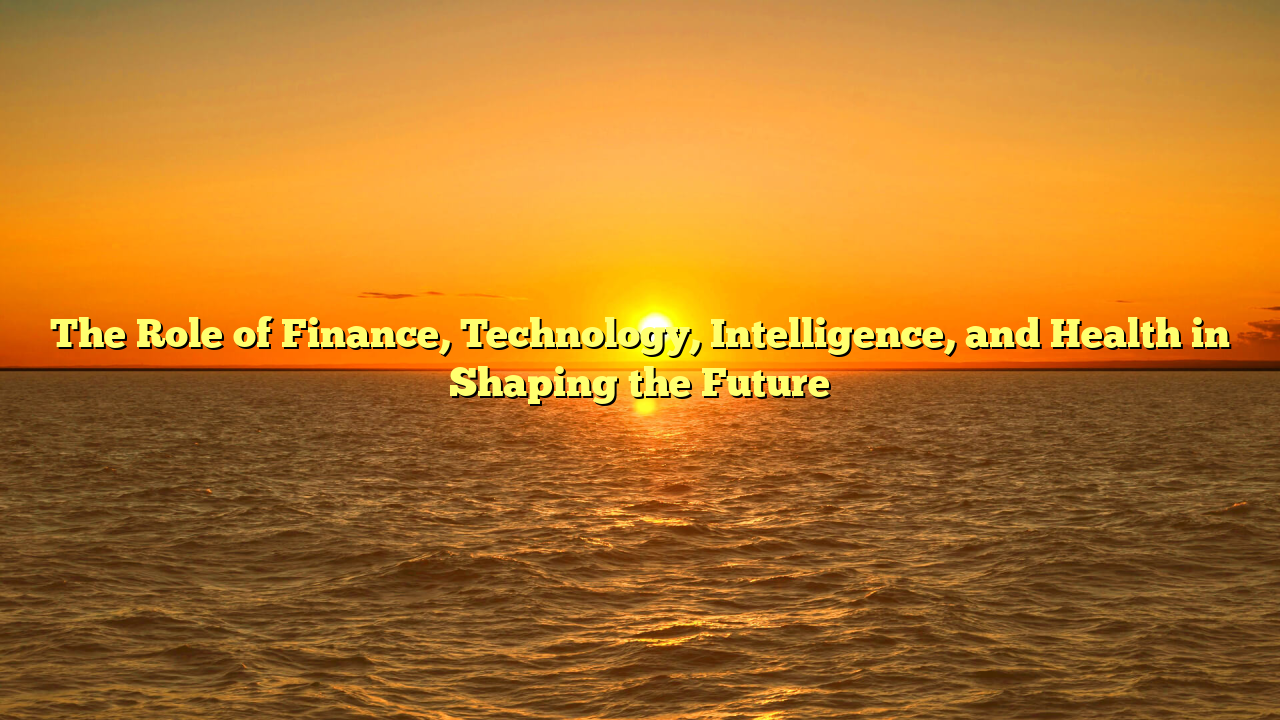In today’s world, the integration of economics, innovation, smart systems, and health has revolutionized the way we live, work, and think. These forces are not only shaping the present but are also driving for a more sustainable and prosperous future. In this article, we will explore how each of these components interacts and how they collectively influence society.
Finance: The Backbone of Global Progress
Finance plays a crucial role in economic growth and is a key driver of innovation. The ability to secure funding allows businesses and governments to finance projects that push the boundaries of what is possible. Moreover, financial markets, such as stock exchanges, provide liquidity and enable the transfer of resources, which can be used to finance emerging technologies, health initiatives, and intelligence-based solutions.
In recent years, the rise of digital currencies and blockchain technology has disrupted the financial landscape. Cryptocurrencies like Bitcoin and Ethereum offer decentralized and secure alternatives to traditional banking systems, allowing people to manage their wealth and transactions without intermediaries. Blockchain, the technology behind these currencies, has found applications beyond finance, particularly in supply chain management and healthcare.
Moreover, the development of Artificial Intelligence (AI) and Machine Learning (ML) has enabled financial institutions to streamline various processes, from customer service to investment strategies. With AI, financial institutions can predict market trends, personalize investment advice, and even detect fraudulent activities, providing a more secure and efficient financial system.
Technology: Revolutionizing Industries
Technology is perhaps the most dynamic force shaping modern civilization. In the past decade, technological advancements have transformed industries, from healthcare to education, and even the way we interact with one another. The rise of the internet, mobile devices, and cloud computing has made data more accessible than ever before. These technologies have facilitated the growth of the digital economy and have enabled businesses to operate on a global scale.
In the realm of healthcare, technology has brought about significant improvements. Telemedicine, wearable health devices, and AI-driven diagnostics have made it possible for healthcare providers to monitor and treat patients remotely, enhancing the accessibility of healthcare services. Moreover, advancements in genomics and biotechnology are enabling personalized medicine, where treatments are tailored to the individual’s genetic makeup, resulting in more effective and less invasive treatments.
In education, technology has created new opportunities for learning through online platforms, virtual classrooms, and interactive content. Students from around the world can now access quality education without the need for physical presence, breaking down barriers and fostering greater global connectivity.
Intelligence: The Key to Solving Complex Problems
Intelligence, both human and artificial, plays an essential role in solving the challenges faced by society. Human intelligence has led to breakthroughs in every field, from science and engineering to art and philosophy. It is through human creativity and innovation that the modern world has evolved, and it is the application of this intelligence that continues to solve pressing global issues.
Artificial intelligence, on the other hand, is taking human intelligence to new heights. By mimicking human cognitive processes, AI systems are capable of analyzing vast amounts of data, recognizing patterns, and making decisions faster and more accurately than humans ever could. This is particularly valuable in fields like healthcare, where AI can analyze medical images, predict patient outcomes, and suggest treatments with remarkable precision.
The combination of human intelligence and AI is also revolutionizing industries like banking, where intelligent systems can forecast market trends and assist in high-frequency trading. Similarly, in climate science, AI is being used to model weather patterns and predict natural disasters, providing valuable data that can be used for disaster preparedness and response.
Health as the Cornerstone of Human Progress
Health is, without a doubt, the most important factor in our overall quality of life. Without good health, all the financial wealth, technological advancements, and intellectual achievements would be meaningless. In this regard, advancements in health technology are essential for ensuring a longer, healthier life for individuals worldwide.
The field of healthcare is increasingly relying on technology to enhance patient care and outcomes. AI-powered diagnostic tools, robotic surgeries, and personalized medicine are transforming the way healthcare is delivered. Additionally, the use of big data allows for the analysis of medical data on a global scale, helping to identify potential health crises before they escalate.
Furthermore, mental health is gaining more attention in the field of healthcare. Technological tools like mobile apps, online therapy platforms, and AI-driven chatbots are making mental health support more accessible to those in need. By addressing both physical and mental health, society can create a more balanced and thriving population.
How Finance, Technology, Intelligence, and Health Interact to Shape the Future
While finance, technology, intelligence, and health are often discussed separately, they are intrinsically linked. The development of one often drives the progress of the others. For example, financial investments in technology enable the creation of groundbreaking health innovations. Likewise, advancements in artificial intelligence contribute to the development of smarter financial systems and better healthcare solutions.
As Slot gacor continue to progress in these areas, the potential for improving quality of life is immense. From healthcare solutions that enhance life expectancy to technological innovations that drive economic growth, the synergy of these four pillars holds the key to a prosperous future. By fostering collaboration across these sectors, society can address the complex challenges of today and build a better tomorrow.
The Role of Finance, Technology, Intelligence, and Health in Shaping the Future



